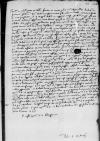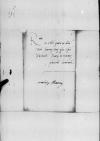Gdańsk Town Council ⌊Domini GedanensesGdańsk Town Council ⌋ iunctis sibi aliis civitatibus, certiores facti de mea scriptione ad s(acram) or s(erenissimam)⌈s(acram)s(acram) or s(erenissimam)⌉ Sigismund I Jagiellon (Zygmunt I) (*1467 – †1548), King of Poland and Grand Duke of Lithuania (1506-1548); Duke of Głogów (Glogau) (1499-1506), Duke of Opava (1501-1506), Governor of Silesia (1504-1506); son of King Kazimierz IV Jagiellon and Elisabeth of Austria⌊regiam maiestatemSigismund I Jagiellon (Zygmunt I) (*1467 – †1548), King of Poland and Grand Duke of Lithuania (1506-1548); Duke of Głogów (Glogau) (1499-1506), Duke of Opava (1501-1506), Governor of Silesia (1504-1506); son of King Kazimierz IV Jagiellon and Elisabeth of Austria⌋ in negotio accisae, scribunt et ipsi, sed ita, ut currum videantur applicare ante boves, quod ex adiuncto exemplo Reverendissima Dominatio Vestra videbit. Et nescio qua prudentia quasi omnium nomine hoc adhuc urgent, a quo ceteros cernunt etiam litteris datis discedere, certi quod impingent, hoc vero inde lucrifaciemus, ut cognitum fiat aulae, quantiphariam simus inter nos serti. Meae litterae nescio quomodo accipientur illorum litteris supervenientibus, praestabat certe neutros scripsisse, offendit puto illos, quod non est obsecutum consilio ipsorum. Mitto litteras, quas huc pertulit nuntius domini Johann von Werden (Constellatus, cf. HE, No. 148, p. 150, footnote No. 12) (*1495 – †1554), 1526 Mayor of Gdańsk (Danzig), from 1527 Starost of Neuenburg (Nowe), 1532-1535, 1538, 1539, 1546, 1551 Burgrave of Gdańsk, from 1535 Starost of Preußisch Mark (Przezmark) (1535-1540 together with Achatius von Zehmen (Cema)), 1536/1537 envoy of the Council of Royal Prussia to the Diet of the Kingdom of Poland held in Cracow (SBPN 4, p. 433-435; ZDRENKA 2, p. 368-369; MAŁŁEK 1976, p. 93, 161)⌊Ioanni a WerdenJohann von Werden (Constellatus, cf. HE, No. 148, p. 150, footnote No. 12) (*1495 – †1554), 1526 Mayor of Gdańsk (Danzig), from 1527 Starost of Neuenburg (Nowe), 1532-1535, 1538, 1539, 1546, 1551 Burgrave of Gdańsk, from 1535 Starost of Preußisch Mark (Przezmark) (1535-1540 together with Achatius von Zehmen (Cema)), 1536/1537 envoy of the Council of Royal Prussia to the Diet of the Kingdom of Poland held in Cracow (SBPN 4, p. 433-435; ZDRENKA 2, p. 368-369; MAŁŁEK 1976, p. 93, 161)⌋.
Fuit hic apud me venerabilis dominus Alexander Sculteti (Scholtcze) (*ca. 1485 – †1570), doctor of canon law, cartographer, historian and friend of Copernicus; accused by Dantiscus and Stanisław Hozjusz (Hosius) of Sacramentarian heresy, in 1540 banished by King Sigismund I Jagiellon; in 1541 imprisoned by the Inquisition in Rome; after release from prison in 1544 he stayed in Rome for the rest of his life; 1509-1516 notary at the Roman Curia; 1519-1541 Canon of Ermland (Warmia), 1530-1539 Chancellor of the Ermland Chapter; 1536-1538 administrator of the komornictwo of Mehlsack (Melzak, today Pieniężno) (KOPICZKO 2, p. 299; SBKW, p. 219-220)⌊Alexander ScultetiAlexander Sculteti (Scholtcze) (*ca. 1485 – †1570), doctor of canon law, cartographer, historian and friend of Copernicus; accused by Dantiscus and Stanisław Hozjusz (Hosius) of Sacramentarian heresy, in 1540 banished by King Sigismund I Jagiellon; in 1541 imprisoned by the Inquisition in Rome; after release from prison in 1544 he stayed in Rome for the rest of his life; 1509-1516 notary at the Roman Curia; 1519-1541 Canon of Ermland (Warmia), 1530-1539 Chancellor of the Ermland Chapter; 1536-1538 administrator of the komornictwo of Mehlsack (Melzak, today Pieniężno) (KOPICZKO 2, p. 299; SBKW, p. 219-220)⌋ dolorem animi sui in sinum meum effundens ac gratiam sibi Reverendissimae Dominationis Vestrae per me redintegrari petens, causam ipsam Reverendissima Dominatio Vestra potest conicere. Alexander Sculteti (Scholtcze) (*ca. 1485 – †1570), doctor of canon law, cartographer, historian and friend of Copernicus; accused by Dantiscus and Stanisław Hozjusz (Hosius) of Sacramentarian heresy, in 1540 banished by King Sigismund I Jagiellon; in 1541 imprisoned by the Inquisition in Rome; after release from prison in 1544 he stayed in Rome for the rest of his life; 1509-1516 notary at the Roman Curia; 1519-1541 Canon of Ermland (Warmia), 1530-1539 Chancellor of the Ermland Chapter; 1536-1538 administrator of the komornictwo of Mehlsack (Melzak, today Pieniężno) (KOPICZKO 2, p. 299; SBKW, p. 219-220)⌊CuiAlexander Sculteti (Scholtcze) (*ca. 1485 – †1570), doctor of canon law, cartographer, historian and friend of Copernicus; accused by Dantiscus and Stanisław Hozjusz (Hosius) of Sacramentarian heresy, in 1540 banished by King Sigismund I Jagiellon; in 1541 imprisoned by the Inquisition in Rome; after release from prison in 1544 he stayed in Rome for the rest of his life; 1509-1516 notary at the Roman Curia; 1519-1541 Canon of Ermland (Warmia), 1530-1539 Chancellor of the Ermland Chapter; 1536-1538 administrator of the komornictwo of Mehlsack (Melzak, today Pieniężno) (KOPICZKO 2, p. 299; SBKW, p. 219-220)⌋ tametsi non sum admodum affectus, tamen movet me ecclesiae istius adversitas, quam in hac clericorum vacillantia et paucitate per sacrum hoc tempus huiusmodi pertur stain⌈[pertur]pertur stain⌉bationibus concuti et censurarum ecclesiasticarum acrimonia affligi certe erit indecens stain⌈[ens]ens stain⌉. Et quoniam non omnia expendunt omnes, rei turpitudo, quam Reverendissima Dominatio Vestra insectatur, a personis in ecclesiam ipsam dimanabit.
Rogo igitur, Reverendissima Dominatio Vestra ecclesiae illi suae hoc praestare commodi velit, ut processum institutum post Paschale usque tempus suspendat ac excommunicatos illos, qui non facile vitari a populo possunt, absolvi mandata cum reincidentia ad beneplacitum Reverendissimae Dominationis Vestrae, si non paruerint.
Non possum autem pro nostra mutua fide et secreto Reverendissimam Dominationem Vestram non monere, quod mihi mandata Reverendissimae Dominationis Vestrae legenti videbatur notarium, qui monitoria scripsit, improvidum fuisse omittendo sententiam vel poenam excommunicationis. Quae nisi expresse fuit posita, non potuit ad illius declarationem procedi nec sufficit, meo quidem iudicio, generalis illa comminatio censurarum. Erit igitur vel de integro instituendus processus, vel alio remedio prospiciendum, ne habeant homines, quod cavillentur. Haec bona fide a me scripta Reverendissima Dominatio Vestra non aegre feret, spero.
Dominus Alexander Sculteti (Scholtcze) (*ca. 1485 – †1570), doctor of canon law, cartographer, historian and friend of Copernicus; accused by Dantiscus and Stanisław Hozjusz (Hosius) of Sacramentarian heresy, in 1540 banished by King Sigismund I Jagiellon; in 1541 imprisoned by the Inquisition in Rome; after release from prison in 1544 he stayed in Rome for the rest of his life; 1509-1516 notary at the Roman Curia; 1519-1541 Canon of Ermland (Warmia), 1530-1539 Chancellor of the Ermland Chapter; 1536-1538 administrator of the komornictwo of Mehlsack (Melzak, today Pieniężno) (KOPICZKO 2, p. 299; SBKW, p. 219-220)⌊AlexanderAlexander Sculteti (Scholtcze) (*ca. 1485 – †1570), doctor of canon law, cartographer, historian and friend of Copernicus; accused by Dantiscus and Stanisław Hozjusz (Hosius) of Sacramentarian heresy, in 1540 banished by King Sigismund I Jagiellon; in 1541 imprisoned by the Inquisition in Rome; after release from prison in 1544 he stayed in Rome for the rest of his life; 1509-1516 notary at the Roman Curia; 1519-1541 Canon of Ermland (Warmia), 1530-1539 Chancellor of the Ermland Chapter; 1536-1538 administrator of the komornictwo of Mehlsack (Melzak, today Pieniężno) (KOPICZKO 2, p. 299; SBKW, p. 219-220)⌋, quo se separet a commercio cocae suae, omnino statuit optare curiam quondam domini Felix Reich (*ca. 1475 – †1539), secretary to Łukasz Watzenrode, Bishop of Ermland (Warmia), and his chaplain; from 1518 Chancellor to succeeding Bishops of Ermland: Fabian von Lusian (Luzjański) and Mauritius Ferber; 1518-1525 Provost of Guttstadt (Dobre Miasto) Collegiate Chapter; 1526-1539 Canon of Ermland; 1528 Chancellor of the Ermland Chapter; 1529-1532 administrator of the Chapter's estates in Allenstein (Olsztyn), and in 1538 in Tolkemit (Tolkmicko); 1538-1539 Vicar General of the diocese of Ermland, and Custos of Ermland; 1528-1530 envoy of the Ermland Chapter to the Provincial Diet of Royal Prussia (KOPICZKO 2, p. 265-266; BORAWSKA 1984, p. 176-177; SBKW, p. 200-201)⌊FelicisFelix Reich (*ca. 1475 – †1539), secretary to Łukasz Watzenrode, Bishop of Ermland (Warmia), and his chaplain; from 1518 Chancellor to succeeding Bishops of Ermland: Fabian von Lusian (Luzjański) and Mauritius Ferber; 1518-1525 Provost of Guttstadt (Dobre Miasto) Collegiate Chapter; 1526-1539 Canon of Ermland; 1528 Chancellor of the Ermland Chapter; 1529-1532 administrator of the Chapter's estates in Allenstein (Olsztyn), and in 1538 in Tolkemit (Tolkmicko); 1538-1539 Vicar General of the diocese of Ermland, and Custos of Ermland; 1528-1530 envoy of the Ermland Chapter to the Provincial Diet of Royal Prussia (KOPICZKO 2, p. 265-266; BORAWSKA 1984, p. 176-177; SBKW, p. 200-201)⌋ et parere mandatis Reverendissimae Dominationis Vestrae. De his et aliis latius inter nos, cum dabitur convenire.
Nuntius meus hinc abiit Dominica Oculi[1]. Quem existimo hodie venire Cracow (Kraków, Cracovia), city in southern Poland, Małopolska, on the Vistula river, from 1038 capital of the Kingdom of Poland⌊CracoviamCracow (Kraków, Cracovia), city in southern Poland, Małopolska, on the Vistula river, from 1038 capital of the Kingdom of Poland⌋. Quem reversum mox ad Reverendissimam Dominationem Vestram mittam cum his, quae attulerit.
The Kos (Koss, Cossi) ⌊CossorumThe Kos (Koss, Cossi) ⌋ causa ut ita [...]datur on the margin⌈[...] hidden by binding⌈[...][...] hidden by binding⌉datur[...]datur on the margin⌉, quemadmodum Reverendissima Dominatio Vestra consulit, admodum placet.
Cupio Reverendissimam Dominationem Vestram in bona valetudine diu esse felicem.


 BCK, 1597, p. 622
BCK, 1597, p. 622